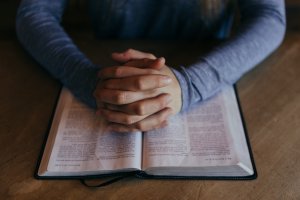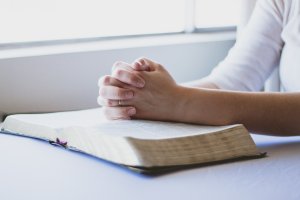We don't think religious worship should play any part in the formal business of the state.
We want to see parliamentary and local government meetings conducted in a manner equally welcoming to all attendees, whatever their personal beliefs.
Parliamentary prayers
Sittings in both the House of Commons and the House of Lords begin with Anglican prayers. MPs and peers stand for prayers facing the wall behind them – a practice thought to have developed due to the difficulty members would historically have faced of kneeling to pray while wearing a sword.
When the chamber is at its busiest, parliamentary prayers act as a bizarre and antiquated seat reservation system. Even MPs and peers who are slated to speak have no option but to attend prayers in order to reserve a seat.
Whilst they may be viewed by some as an important tradition, parliamentary prayers serve to assert the superiority of Christianity (and the Church of England in particular) at Westminster. This 'tradition' is inimical to a modern, pluralistic, secular democracy.
In the Scottish Parliament, Tuesday afternoon sessions begin with 'Time for Reflection', with faith and belief representatives invited to addresses members for up to four minutes. The Northern Ireland Assembly begins formal business with a period of two minutes of silent prayer or contemplation. The Welsh Assembly has adopted no such rituals.
Parliamentarians who wish to pray are free to do so. But prayers should not form part of the official business of Parliament.
Council prayers
Many local authorities in Britain also begin their meetings with prayer.
Local democracy should be equally welcoming to all sections of society, regardless of their religion or belief. Council meetings should be conducted without anyone feeling excluded, or compelled to either participate in prayers or absent themselves from part of the meeting.
Council prayers open the door to wholly unnecessary conflict and sectarian squabbles within local authorities. There is a history of local councillors being bullied and marginalised for challenging council prayers.
The absence of prayers from the formal business of meetings in no way impedes religious freedoms or denies anybody the right to pray. Conversely, organised worship in secular settings imposes worship on those who do not share the faith. A genuine commitment to freedom of religion or belief is incompatible with including acts of worship in the formal business of council meetings.
If local authorities wish to hold a moment of silent reflection at the beginning of a meeting, or if councillors wish to meet for prayers prior to the meeting, they are at liberty to do so.
Take action!
1. Write to your MP
Please enter your postcode and urge your MP to support an alternative to parliamentary prayers, to make parliament more welcoming to people of all faiths and none.
2. Share your story
Tell us why you support this campaign, and how you are personally affected by the issue. You can also let us know if you would like assistance with a particular issue - for example, if you would like to challenge prayers at your own council.
3. Join the National Secular Society
Become a member of the National Secular Society today! Together, we can separate religion and state for greater freedom and fairness.
Latest updates
NSS asks council in north Wales to separate prayers from meetings
Posted: Wed, 28 Aug 2019 16:41
The National Secular Society has asked councillors in Denbighshire in north Wales to review their practice of holding prayers before meetings after a councillor criticised them.
Prayers are currently said in the council chamber in the county shortly before official business begins. In comments reported by North Wales Live last week Councillor Paul Penlington said this was unfair on those who do not wish to take part in prayers.
Councils in Wales are not legally permitted to summon councillors to prayers. In 2012 the High Court ruled that prayers should not be said as part of formal council business after the NSS initiated a judicial review on the subject.
The ruling remains valid in Wales, except in a few cross-border authorities.
NSS chief executive Stephen Evans has now written to councillors to say Denbighshire's current arrangement "may be in accordance with the letter of the law, but not the spirit".
"Council meetings should be conducted without anyone feeling compelled to participate in prayers, or feeling excluded, or that they have to absent themselves from any part of the meeting.
"We would therefore encourage you to review your arrangements with a view to ensuring that meetings are held in a manner equally welcoming to all attendees, regardless of their individual religious beliefs or lack of belief. To achieve this, religious rituals should play no part in proceedings."
He added that it was "reasonable" for attendees to "expect the chamber to be accessible for a fair interval before the meeting begins to enable them to meet their colleagues, take their seats and prepare".
And he said the "simplest" response would be to remove organised prayers, noting that councillors who wished to pray would still be free to do so away from the meeting.
In his remarks to the press Cllr Penlington said atheists and non-Christians were "in effect forced to be present during a ceremony they don't believe in". He added that they had to "decide whether to participate out of politeness or to not participate and stand out from the crowd as being different".
He also said he had suggested a prayer room for those who wish to pray and some councillors had complained about those who absented themselves from prayers.
Last year the NSS called on the mayor of Barry, in south Wales, to ensure prayers were "sufficiently separate" from council meetings and "entirely optional". The mayor, Janice Charles, had announced plans to hold prayers in the council chamber five minutes before the beginning of meetings.
Image by Free-Photos from Pixabay.
NSS urges councillors in Norfolk to scrap prayers before meetings
Posted: Wed, 17 Jul 2019 15:46
The National Secular Society has urged councillors in Norfolk to abandon the practice of holding prayers at the start of meetings after a councillor tabled a motion to remove them.
Norfolk County Council, which currently holds Christian prayers at the start of meetings, will vote on a motion calling for their end next Monday.
The motion, proposed by independent councillor Mick Castle, instead proposes a short multi-faith service to take place in an alternative room ahead of meetings for those who choose to attend.
In a letter to councillors NSS chief executive Stephen Evans said holding acts of worship immediately before or during council meetings was "incompatible with a genuine commitment to religious freedom".
"The absence of prayers from meetings in no way impedes the religious freedoms of believers or denies anybody the right to pray. However, the inclusion of organised worship in a council setting leads to believers imposing acts of worship on those that do not share their faith.
"I ask you to ensure that all elected councillors, and indeed members of the public, are accorded equal respect and esteem at council meetings, irrespective of their privately held beliefs."
Mr Evans highlighted recent figures from the British Social Attitudes Survey, which found that just 12% of Britons affiliate to the Church of England and 52% are non-religious. He also noted that just 36% of young adults say they have a religion and only 1% identify with the Church of England.
He added that if councillors overwhelmingly wished to replace rather than scrap Christian prayers, holding a period of silent reflection would be a possible option.
Explaining his decision to write the letter, Mr Evans said: "Holding prayers during or immediately before council meetings undermines the principles of equality and freedom of and from religion. It is exclusionary to councillors who do not share the religious tradition in question and compels people to take part in a ritual which they do not wish to be a part of.
"Councillors in Norfolk and indeed elsewhere who wish to take part in religious worship should be expected to separate it from formal council business."
In 2012 the High Court ruled that prayers should not be said as part of formal council business after the NSS initiated a judicial review on the subject.
But in 2015 the government changed the law in England to make prayers, "other religious observance" or "observance connected with a religious or philosophical belief" lawful at local authority meetings.
Explaining his decision to table the motion in Norfolk, Castle said: "We are an increasingly multicultural society so personally I feel it is a bit dated in 2019 to be still saying Christian prayers at the start of council meetings."




